#like if you want to read a novel from a different culture than at least make the effort to learn about the culture
Explore tagged Tumblr posts
Text
(pls fact check me if i'm wrong!! /gen and also disclaimer that i'm not chinese!!)
one of my biggest pet peeves with this fandom is that people confuse fanon with canon too much or they miss the cultural differences in mdzs because i keep seeing people say that wei wuxian is the adopted son of jiang fengmian and yu ziyuan which is not true.
normally, i don't want to be "that bitch" who comments on stuff like this but when it concerns the cultural difference and/or is relevant to someone's character than i will be That Bitch.
because wei wuxian was not officially adopted or fostered or any such thing.
wei wuxian refers to jiang cheng as "shidi" (师弟, shīdì) which means younger martial brother and is used for junior male members of one’s own sect. the character for "shi" (师, shī) means sect and the character for "di" (弟, dì) means younger brother but this is just a term of address. the same for jiang yanli: wei wuxian only calls her "shijie" (师姐, shījiě) which means older martial sister and is used for senior female members of one’s own sect. "jie" (姐, jiě) uses the character for older sister but again, it's just a term of address that shows you're familiar with someone and can even have romantic undertones. (meanings taken from the seven seas translation and my chinese knowledge which you're free to correct if i'm wrong! /gen).
wei wuxian doesn't directly refer to jiang cheng or jiang yanli as his blood or adopted siblings neither jiang fengmian or yu ziyuan as his adopted or fostered parents. there are a few examples when they make the connection and reveal that they see each other in that way though, which is why a lot of people see them as family and it happens a lot in fanfiction and fanart etc. for example, when wei wuxian compares them (jc and wwx) to the twin jades of gusu. or when jin zixun calls wei wuxian 'just a servant of the jiang sect' and jiang yanli says he's like a brother to her. wei wuxian also mentions in the family banquet extra that he went to the jiang sect's family banquets too. but wei wuxian isn't ever officially recognised as an adopted son.
so he would not be included in the family records. to the jiang sect's records, wei wuxian was just the first disciple and that's it. and this is so important to wei wuxian's character because he has no one. when he defects from the jiang sect, he's all alone with no support from anyone. he was just a disciple of the jiang sect and he served them like any other disciple then he defected and now he has no ties or relations to them.
a side point but this is also why people ship jiang yanli or jiang cheng with wei wuxian but that is a whole other can of worms that i don't want to open. (for clarity: i don't personally ship wwx with anyone but lwj but i see no problem with shipping wwx and jc or jyl! i won't go anymore into this as i'm not chinese so i can't really talk about the cultural differences as well as chinese people can, so you can listen to them instead!)
basically, the relationship between wei wuxian and the jiang family is purely down to intrepretation but just bare in mind that it is never official or canon in the novel!
#it just bugs me when ppl say shipping wwx and jc or jyl is incest#or that wwx is an adopted son of the jiang family#bc it's just not true and it's misinformation!!#like if you want to read a novel from a different culture than at least make the effort to learn about the culture#mdzs#cql#the untamed#mo dao zu shi#mo xiang tong xiu#mxtx#mxtx mdzs#danmei#wei wuxian#jiang cheng#jiang yanli#jiang wanyin#wei ying#jiang fengmian#yu ziyuan#pls don't cancel me and i'm an autistic little guy getting annoyed abt misconceptions on my special interest#starrywangxian#i swear i post other things other than rants and angst <3
3 notes
·
View notes
Text
An Affair to Remember
Alright, let's get into Affair the Series, which has been giving me brainrot the past few weeks so feels like a good time to get into an analysis of why I find it so fascinating. Eventually I'd love to do a deeper dive into Thai GLs and that industry (that's a whole other thing though) but after having seen my share of them (Gap, Show Me Love, TSOU, The Loyal Pin) I've really found myself falling into the rabbit hole with Affair the Series and the way it depicts friendship, love, and acceptance.

Deep dive below and also thank you gif makers for your work 🙏🏽
(also will go over events from episodes 1-5, so spoilers ahead if not up-to-date)
So first off, I have read the novel, which is the first time I've finished one of those for a GL and quite frankly, the translation wasn't that great but the story still came through. I won't refer to it much and will base this on the show as I think they've done a fantastic job with the adaptation and fingers crossed continue to do so.
Where in most GLs the core conflict is external. The main couple can't be in love typically due to familial/cultural pressure or a man interfering (that still exists to an extent here) the main conflict in Affair is simply that Wan and Pleng love each other too much but they do so in different ways.
When we meet Wan and Pleng they're 17 years old and have spent their entire lives together. They're sisters but not and while Wan seems to have a social circle, Pleng really has no other friends outside of Wan. The spoiled rich girl and the maid's daughter. Couldn't be more different if they tried and yet by circumstance their lives are as intertwined as it gets.
At 17, they have different ideas for their futures. Pleng is musically talented, wins every contest and is financially set. She can live the life she wants. If she wants to be a musician then so be it. Her parents love and support her and there's no pressure. Wan on the other hand has an overbearing mother (and a resentful father), no prospects for her future but at least she has Pleng.
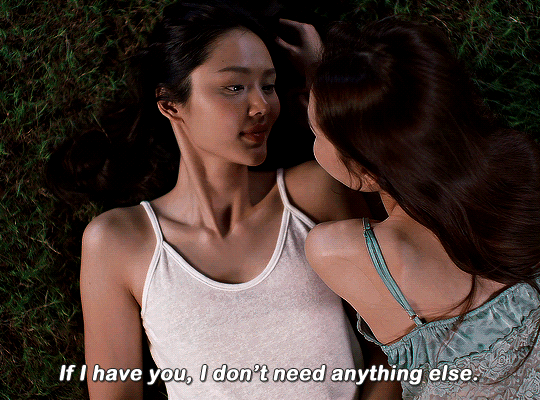
Despite her parents, Wan loves wholly and openly. She knows she loves Pleng and while she doesn't yet know it she does know that Pleng loves her too. I would argue that Wan truly knows herself, which is why she comes across as so self-assured in their younger years. She's slowly trying to guide Pleng to understand herself too.
Pleng, however, has never had to sit with her emotions in the same way. Take this as differences of personality, class and upbringing. Now that they're 17 and entering adulthood, Pleng has to start engaging with the world (and her emotions) rather than hiding behind the rich, insular lifestyle she's had up to this point.
As the idea of boyfriends comes up, Pleng starts to lash out. She's jealous, she's pushy but really she's just in love with her best friend and doesn't know it. Everything starts happening too fast. Wan meets a boy at an art gallery, Aunt Wi pushes Pleng to help Wan get with Ek, Pleng's dad is extremely stressed and she doesn't know to what extent and throughout that Pleng is dealing with her feelings that for some reason just won't go away. Feelings that Wan keeps bringing up in her over and over.

Pleng is a mess. She doesn't know how to connect with her peers, she knows something is wrong with her dad, she sees that Wan is seemingly moving forward in a way that she's not (dating a boy) and whether she realizes it she continues to isolate herself.
From Wan's perspective she couldn't care less about dating Ek. She's already completely devoted to Pleng (in ways that Pleng doesn't even know).
They're 17, hormonal, gay, and incapable of seeing each other's perspective. Wan wants Pleng to let her in. Pleng can't help but push everyone away.

As soon as Pleng starts to really come to terms with her feelings about Wan. That's when everything falls apart. Her dad kills himself, her mom goes into cardiac arrest, all of her family's assets are seized and she's now orphaned and staying with Wan's parents who clearly and vocally have no space for her. Pleng who was already struggling to find her footing before that fateful night now has absolutely nothing to stand on.
The break point is when Pleng finds out about Wan's academic achievements and that Wan had been hiding that truth about herself their entire lives. Wan has always been intelligent and capable but hidden herself behind a veil of ineptitude. Wan in loving Pleng puts her on a pedestal to her own detriment. She has no issue blighting her own light so that Pleng can shine but from the moment we meet 17 year old Pleng in the show we see her pushing Wan to better herself. Wan thinks loving Pleng means her own success doesn't matter whereas Pleng loves Wan and all of her potential.
They both love each selflessly but while Wan would burn the whole world to keep Pleng warm, Pleng loves Wan despite her own existence. So when Pleng leaves she writes,
"Your parents will feel at ease. And you'll finally get to live your life as your true self... I know you love me but I also want you to love yourself. And be proud of who you are."
For Pleng, her leaving is the ultimate way to show her love to Wan. A clean break. She runs away so Wan can thrive but here's the thing Wan needs Pleng to keep her grounded. Pleng does too but she can't see it at this point. Too much has happened and so, in her desperation she removes herself. She is her father's daughter after all.

So when 13 years pass and Wan has spent that entire time holding on to whatever she can to keep herself close to Pleng (becoming a doctor, riding a bike to work, marrying Ek, separating herself from her parents); Pleng has become a ghost of herself. Wan has imbued herself with all the things she thinks/knows Pleng would like while Pleng is stuck in a cycle that she can't get out of: play music, make a bit of money, pay rent, rest, repeat.
Pleng never reaches out to Wan because why would she? Her loving Wan means staying away and on top of that there's a sense of shame of what her life has become.
So when they finally meet again it's too much. Wan is successful but she's still clearly in love with Pleng and while it was all Wan's doing, in a way her success is a direct result of Pleng's influence. In removing herself, Pleng slowly begins to realize not just that she took Wan's smile with her but the why and how. Wan's changed and devoid of the joy and innocence that Pleng loved most.

They slowly fall back into their natural rhythms but Pleng still can't accept her own presence in Wan's life. Wan is back to pushing (albeit more aggressively then before - time was wasted) and in pushing Pleng, Pleng pushes back. If they take their relationship that one step further, what then? What if it falls apart? Why not just stay in a cycle where nothing shifts? What if there's another ringing shot in the distance and everything changes in a moment?
If there's one core trauma to Pleng as a character it's her desperation to not feel like a burden to anyone. Especially Wan. And then she finds out that Wan (though separated) is still married to Ek and she can't accept that she could have ruined Wan's potential happiness. Not understanding that Pleng herself is Wan's happiness. Pleng feels like a disruption because at the root of it the thing she wanted above all for Wan, "I also want you to love yourself. And be proud of who you are" is not something that Pleng accepts for herself.

I'll leave it there and hope the show navigates the situations that are about to come as well as they have so far but kudos as Affair manages to oh so gracefully skirt what could otherwise be an incredibly toxic relationship. Somehow they manage to give these two characters so much grace despite their flaws. And truly that's also a huge credit to Sonya and Lookmhee's abilities.
It's chaotic and messy but in coming back together these two might just realize that's how they both best shine.

#affair the series#affair#wanpleng#wan x pleng#thai gl#sonya saranphat#lookmhee punyapat#show analysis#I didn't even touch on it but these two are truly just stunning#And their acting abilities are incredible#Also this show is so wonderfully crafted despite its overuse of music cues#and there's no silly sound effects#if you haven't watched yet you really should#though don't know why anyone would have read all this otherwise#in fact#thailand is the gift that keeps on giving
246 notes
·
View notes
Text
Disclaimer that this is a post mostly motivated by frustration at a cultural trend, not at any individual people/posters. Vagueing to avoid it seeming like a callout but I know how Tumblr is so we'll see I guess. Putting it after a read-more because I think it's going to spiral out of control.
Recent discourse around obnoxious Linux shills chiming in on posts about how difficult it can be to pick up computer literacy these days has made me feel old and tired. I get that people just want computers to Work and they don't want to have to put any extra effort into getting it to Do The Thing, that's not unreasonable, I want the same!
(I also want obnoxious Linux shills to not chip in on my posts (unless I am posting because my Linux has exploded and I need help) so I sympathise with that angle too, 'just use Linux' is not the catch-all solution you think it is my friend.)
But I keep seeing this broad sense of learned helplessness around having to learn about what the computer is actually doing without having your hand held by a massive faceless corporation, and I just feel like it isn't a healthy relationship to have with your tech.
The industry is getting worse and worse in their lack of respect to the consumer every quarter. Microsoft is comfortable pivoting their entire business to push AI on every part of their infrastructure and in every service, in part because their customers aren't going anywhere and won't push back in the numbers that might make a difference. Windows 11 has hidden even more functionality behind layers of streamlining and obfuscation and integrated even more spyware and telemetry that won't tell you shit about what it's doing and that you can't turn off without violating the EULA. They're going to keep pursuing this kind of shit in more and more obvious ways because that's all they can do in the quest for endless year on year growth.
Unfortunately, switching to Linux will force you to learn how to use it. That sucks when it's being pushed as an immediate solution to a specific problem you're having! Not going to deny that. FOSS folks need to realise that 'just pivot your entire day to day workflow to a new suite of tools designed by hobby engineers with really specific chips on their shoulders' does not work as a method of evangelism. But if you approach it more like learning to understand and control your tech, I think maybe it could be a bit more palatable? It's more like a set of techniques and strategies than learning a specific workflow. Once you pick up the basic patterns, you can apply them to the novel problems that inevitably crop up. It's still painful, particularly if you're messing around with audio or graphics drivers, but importantly, you are always the one in control. You might not know how to drive, and the engine might be on fire, but you're not locked in a burning Tesla.
Now that I write this it sounds more like a set of coping mechanisms, but to be honest I do not have a healthy relationship with xorg.conf and probably should seek therapy.
It's a bit of a stretch but I almost feel like a bit of friction with tech is necessary to develop a good relationship with it? Growing up on MS-DOS and earlier versions of Windows has given me a healthy suspicion of any time my computer does something without me telling it to, and if I can't then see what it did, something's very off. If I can't get at the setting and properties panel for something, my immediate inclination is to uninstall it and do without.
And like yeah as a final note, I too find it frustrating when Linux decides to shit itself and the latest relevant thread I can find on the matter is from 2006 and every participant has been Raptured since, but at least threads exist. At least they're not Microsoft Community hellscapes where every second response is a sales rep telling them to open a support ticket. At least there's some transparency and openness around how the operating system is made and how it works. At least you have alternatives if one doesn't do the job for you.
This is long and meandering and probably misses the point of the discourse I'm dragging but I felt obligated to make it. Ubuntu Noble Numbat is pretty good and I haven't had any issues with it out of the box (compared to EndeavourOS becoming a hellscape whenever I wanted my computer to make a sound or render a graphic) so I recommend it. Yay FOSS.

209 notes
·
View notes
Text
Recently, I’ve been feeling a strong urge to write fanfiction, but as a Japanese person, I can’t help but feel the immense barriers of language and cultural differences standing in my way.
I’ve always loved writing fanfiction and have more experience as a writer than as an artist. But I don’t know any English at all. The Japanese short story collection about Seb and Omi that I posted on AO3 over a year ago still has zero bookmarks (which isn’t surprising 😂). In other words, as someone who can only write in Japanese, my value as a writer in this fandom is practically zero. I have so many stories I want to tell, but since I can’t speak English, I can’t even stand at the starting line 🤣🤣🤣. Even if I started studying English intensively now, it would probably take years before I could write stories in English on my own 🤣.
On top of that, I only have a Japanese perspective shaped by Japanese values and ways of thinking. For someone like me, it’s impossible to depict Western characters’ personalities, thoughts, and actions without them feeling off. The more I read fanfiction written by Western authors in this fandom, the more I realize how significantly values and ways of thinking differ between Japan and the West. I notice these differences so often that I’m genuinely shocked. With art or comics, I can at least visually mask these cultural discrepancies to some extent, but with novels, where detailed psychological descriptions are key, there’s no way to gloss over these differences.
Foolishly, I’ve been thinking about translating my stories using ChatGPT, just as I do with comic dialogues. But even with AI tools, translation takes an enormous amount of time. And more importantly, translating between Japanese and English is incredibly difficult—no matter how advanced modern tools like DeepL or ChatGPT are, they can’t produce truly accurate translations. This fandom is already filled with amazing, beautifully written stories in natural English. So who would ever want to read a poorly translated story in unnatural English produced by tools like ChatGPT or DeepL? 🤣🤣🤣
With art or comics, I know that I can improve with practice. But when it comes to mastering English and capturing the nuances of cultural values, no matter how hard I try, I will always fall short compared to Western creators. I recently became painfully aware of this reality, and now I feel so sad and empty. Even so, I can’t suppress this foolish urge to write stories. Someone, please give me the final push to give up on writing fiction 🤣🤣🤣🤣🤣.
(I couldn’t find the right term, so I used the word “Western” in this text. But I do understand that there are many people in the West who aren’t fluent in English, and that cultural values differ greatly from country to country.) (And to all the non-native English writers who work hard and create amazing stories, I have the utmost respect for you.)
98 notes
·
View notes
Text
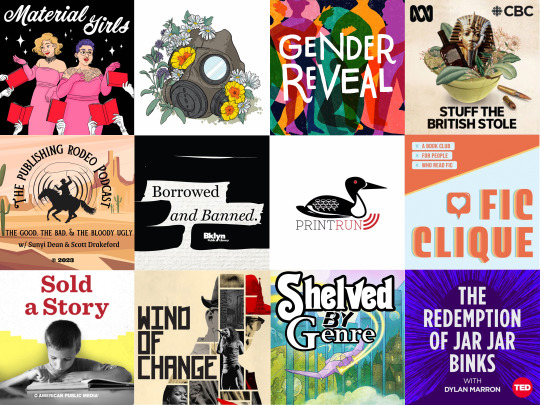
Podcasts I love and recommend
I spent a truly extraordinary amount of time listening to podcasts this year, including my perennial faves and some new discoveries! I wanted to write up a bit about each of the ones I recommend the most highly, and give them some of the same attention and love I put into my book reviews. Recs below the cut. (This post brought to you by my patreon).
MATERIAL GIRLS- This is, hands down, my favorite podcast of all time. Friends and scholars Hannah McGregor and Marcelle Kosman take on a new pop culture subject in each episode and examine the material conditions and historical setting that made their subject of the week zeitgeisty. They bring an expansive feminist lens, different types of critical theory, and tons of humor to each topic. I feel like I am slowly getting a media studies degree one episode at a time as I listen to this show. Some of my favorite episodes tackled Jurassic Park, Dopamine, Twilight, Taylor Swift, Bridgerton, and Queer Eye. I have guested on this podcast and also support them on patreon so I can get all of that sweet sweet bonus content! (This show uploads full transcripts but they lag behind the audio episodes in updates).
GENDER REVEAL- Journalist, writer, and now small-press founder Tuck Woodstock interviews trans folks on a wide range of topics. A characteristic episode includes some deeply intimate or tender moments mixed with wild tangents, extreme silliness and irreverence. I listen to every single episode and also back them on patreon for the extra episodes; some recent conversations that have really stuck with me include Colby Gordon, a founder of Early Modern Trans Studies; trans historian Susan Stryker; Jewish anti-Zionist comic author Solomon J Brager; writer Lucy Sante; and multimedia artist (and friend of mine) Shing Yin Khor. This podcast gets a special award for recommending more books that I actually end up reading than any other podcast. This year alone I’ve read at least 6 books by authors Tuck has interviewed (I Heard Her Call My Name, Heavyweight, Hijab Butch Blues, Transgender History, Boys Weekend, Practical Anarchism, Falling Back in Love With Being Human) and I have more on my TBR (The Prospects, When Monsters Speak). (This show also uploads full transcripts).
PUBLISHING RODEO- This is a new fav! I discovered this podcast over the summer and binged all 44 available episodes in about a month. Hosts Sunyi Dean and Scott Drakeford are friends and fellow Tor authors. In 2022, they both released debut novels in the same genre, in the same year, with the same publisher, to very different results. They are remarkably candid about the nuts and bolts of their publishing deals, and in each episode interview another author, usually one early in their publishing career, on signing agents, selling books, the size of their advance, resulting royalties and more. I have learned so much about the publishing industry from this show- I’ve sold 3 books, and yet it turns out there’s still loads I don’t know. I’d recommend starting with the intro episode in which Sunyi and Scott introduce themselves and then you can jump around to any interview which interests you. Their recent conversation with Chuck Tingle was especially delightful. (This show also uploads full transcripts).
PRINT RUN PODCAST- Another new discovery, also about the publishing/writing industry. Hosts Laura Zats and Erik Hane are both literary agents at a small agency they founded together. They discuss current events in the book news world or focused single subjects, often for early career writers. Because this show is more focused on current events, I haven’t dived super far into their back catalog, but listened to a handful of episodes from the past two years and plan to continue listening as new episodes are released. Laura and Erik also have a very cool patreon special bonus offering- they will critique query letters and first pages submitted from listeners. I haven’t written a query letter since probably 2017, so the refresher course was extremely valuable! I’d recommend the episode The Books That Made Us as a good starting point in this show. (As far as I can tell, they do not release transcripts.)
FIC CLIQUE- This is an old favorite I have recommended before. In a standard episode, the three hosts Nic, Reid, and Brenna each bring one fanfiction to read and discuss book-club style. In the past year, I’ve been particularly enjoying some of the mini-episodes that break this format. If you want to give it a try but you’ve less interested in hearing people talk about a fandom you aren’t in, I’d suggest the episodes on Mapping Fannish Migration, Books and Fandom, and Genre and Subgenre in Fanfiction. (As far as I can tell, they do not release transcripts.)
FANSPLAINING- Tragically (for me), this beloved long-running show wrapped this summer with its final standard format episode after 9 years and 200+ episodes. However, there’s still more to look forward to! Fansplaining has shifted to become primarily a publisher of fandom related journalism, and they’ve been releasing audio versions of each article along with the text, generally recorded by the author. I find these so charming, almost like new mini episodes of the show. Find a full list of their articles here; I especially loved the recent ones on The Beatles RPF fandom (still going strong!) and Bringing Fanfiction into the Classroom. (This show has full transcripts).
SHELVED BY GENRE- In this show, the three hosts re-read popular sci-fi or fantasy book series and record long rambling episodes which both summarize and analyze their current texts. When I say they ramble… most episodes are over 2 hours, some pushing 3 hours. I started on this show when they began reading the Earthsea series by Ursula K Le Guin, which I have read multiple times in past years. I skipped their episodes on Gene Wolfe, who I haven’t read, as well as some movie and horror focused episodes. But I happily dived back in for the unit on Mercedes Lackey’s Last Herald Mage Trilogy, which was perhaps the first book with an out queer character I ever read; the queer host on the show, Michael, similarly remembers this as a foundational queer text from his teen years. I am very happy that the next author the hosts plan to discuss is William Gibson, who I might re-read to keep pace with the show. I recommend checking out their 40+ back episodes to see if there’s something you are interested in! (As far as I can tell, they do not release transcripts.)
STUFF THE BRITISH STOLE- I found this 3 season podcast sometime in the middle of the year, hosted by an Australian journalist following the trail of objects (or sometimes animals or people) the British stole during the height of their colonial reign. The episodes generally run 35-45 minutes and feature interviews, history, and usually live records of the host seeing the item, whether it’s currently in a museum, a private collection, a random high school, or the site of a foreign grave. You can jump around to whatever topic that interests you, but I can definitely recommend the episode Blood Art as one of very few in which an item is repatriated! (As far as I can tell, they do not release transcripts.)
LIVE LIKE THE WORLD IS DYING- A Margaret Killjoy and a group of queer anarchist friends rotate the hosting of this show. Once a month they release a “This Month in the Apocalypse” update which I started listening to in November and plan to keep up with going forward, but probably won’t listen to back episodes of as it’s very current-events focused. However there are other conversations/interview style episodes released between the monthly updates. Two recent interviews that really stuck with me were Spencer Sunshine on his zine “40 Ways To Fight Fascists” (which I subsequently downloaded and read) and Henri Feola on their zine “The Veil Between Worlds is Plexiglass”, which chronicles some of their experience spending 96 days in jail after being arrested protesting Atlanta’s Cop City and the police murder of Tortuguita, a protester defending the Weelaunee People’s Forest. I have a friend in Atlanta who was arrested at the same protest so I’ve been following this case; this conversation felt important and needed, as I expect there will be even more arrests of protestors in the coming years. (As far as I can tell, they do not release transcripts.)
BORROWED AND BANNED- The Brooklyn Public Library released this 7 episode limited run podcast on book bans, book challenges, how it’s affecting teachers, students, librarians and authors. I was one of several authors interviewed for the show, and you can hear my interview as a separate bonus episode; but I highly recommend listening to the whole thing because it’s a very close and personal look at these national issues- which I expect to get worse under the Trump administration. (This show has full transcripts).
SOLD A STORY- This is a 10 episode limited run podcast about how a misinformed educational specialist’s incorrect idea of how children learn to read damaged the literacy of a whole generation of school children. This podcast explores different research on reading, how sweeping educational policies like Bush’s “No Child Left Behind” impacted schools and how textbook companies pushing expensive reading-kit book sets have all negatively impacted schools. The later episodes contain messages and voicemails from parents, teachers, and students reacting to the show and some hope of change on better educational resources. I’ve probably made this sound dry but it’s genuinely a very emotional journey- as someone who really struggled to learn to read, I found this show riveting. (This show has full transcripts).
THE REDEMPTION OF JAR JAR BINKS- This 6 episode limited run show is hosted by Dylan Marron, better known as the host of Conversations with People Who Hate Me and for his role as Carlos on the podcast Welcome to Nightvale. Marron was the target of a fair amount of internet hate himself, which made him interested in how people express hate towards public figures online, and why. This led him to investigate what is possibly the first ever case of cancellation online: the rage directed at the character Jar Jar Binks in the Star Wars prequel series which began releasing in 1999, and how that hate destroyed the mental health of and nearly ended the acting career of the young Black actor who voiced and helped develop the character. Marron is a deeply compassionate interviewer, and a good researcher. He finds and talks to fans who built “kill Jar Jar Binks” websites in the days of the early web, he interviews the actor, Ahmed Best, he interviews folks involved with the production on the Star Wars prequels. I am a lukewarm Star Wars fan at best (lol) but I loved this podcast. (This show has full transcripts).
WIND OF CHANGE- I picked up this 8 episode limited run podcast because it was researched, written and hosted by Patrick Radden Keefe, the author of Say Nothing, one of the best nonfiction books I’ve ever read. In this show, Keefe digs into rumors of the CIA using cultural productions, especially pop music, as propaganda weapons against the Soviet Union during the Cold War. In particular, he’s interested in one song, “Winds of Change”, by German rock group The Scorpions which became an anthem of change shortly before the fall of the Berlin Wall and then the end of the Soviet Union. Keefe is friends with someone who does a lot of recruiting of ex-CIA folks and has also written a whole book on the CIA, so he’s not without background or connections on this subject; but the question he most wants an answer to might not be one he can ever answer. This was gripping and intriguing, and made me think a lot about soft power and propaganda more generally. (This show has full transcripts).
60 notes
·
View notes
Text
The Crow Road by Iain Banks
I finished The Crow Road and had a little time to think about it. I'll put my thoughts under a Keep Reading in case anyone is trying to avoid spoilers.
As I speculated before, I think it's likely that The Crow Road is more related to Good Omens in philosophy than in plot. I mean, it's not that the plots necessarily have nothing in common, and we could be very surprised in the end of course, but now that I've read the whole book, its philosophical commonalities with GO are both apparent and kind of inspiring. Also, if I were a writer, I'd be more interested in dropping hints about what themes are important than telegraphing my whole plot ahead of time.
So here, I will describe the book and point out themes that I believe may reappear in Good Omens 3.
This is a long post. If you read it, make a cup of [beverage of choice].
Update on 4/20/2024: I made a second post: The Crow Road and Good Omens: Further-Out Thoughts
Below are mentions of suicide, death/murder, and sexual acts.
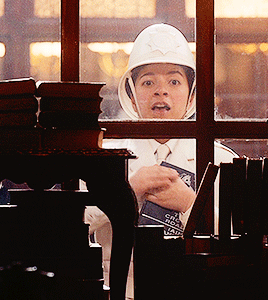
The Crow Road centers around a character named Prentice McHoan, a university student in Scotland who starts to sort out his complicated relationship with his complicated family as he explores the mystery of his uncle Rory's disappearance. Although the book is mostly from Prentice's perspective, the narration jumps around in time with the McHoan family. There are quite a lot of important characters to keep track of; the bare-bones summary I put below doesn't even include some of the important ones. I wanted to make the summary even shorter and simpler than this, but the truth is that this book is not short or simple, and if I made the summary any simpler, it might be downright misleading.
There are at least three major cultural aspects of The Crow Road that I am inexperienced with: the overall culture in the 1950s-1980s (I was born in 1988, so of course wasn't here for the relevant decades), the international experience of the Gulf War (again, born in 1988), and the history and culture of Scotland itself (I'm USAmerican with only reading as a source). As a result, I'm sure there are important dimensions to the book that I've missed. If someone has a different perspective taking some of these things into account, I'd love to know about it.
Also, keep in mind, there is a great deal of descriptive writing in this book. There are a lot of pages about the geography of Scotland, and about Prentice as a kid, and about Prentice's father and uncles hanging out together in their youth, and about various family incidents, and about Prentice spending time with his brothers and friends. At first, these passages seem to just make things more confusing, and in my head, I accused them of being "filler." But they definitely serve a purpose. They're a way of showing and not telling the characters' attitudes and relationships to each other. More importantly, because we get to actually live these experiences with the characters, they are what give all the plot points below their deeper emotional impacts. In other words, the everyday experiences give the plot its deeper meaning. They resonate with one of the core themes in the novel: that our experiences in life, rather than any supposed existence after death, are what matters.
The Crow Road's story is like this:
Prentice is rather directionless in life, and he seems to have trouble investing any energy in his own future as he moons over his unrequited feelings for an idealized young woman named Verity. Soon, Verity ends up in a romance with Prentice's brother, Lewis, and Prentice feels that Lewis "stole" her from him. Prentice has also become estranged from his father, Kenneth, over spirituality. Prentice believes there has to be something more after death because he feels it would be incredibly unfair if people didn't get anything other than this one life; Kenneth is not only a passionate atheist, but is offended by the notion of an afterlife.
Prentice's uncle Hamish, Kenneth's brother, has always been religious, although his religion involves a number of bizarre and offbeat ideas of his own, with inspiration from more traditional Christian notions. Prentice is not really sure about this ideology, but he's willing to talk to Hamish about it and even participates during Hamish's prayers, whereas Kenneth is openly scornful of Hamish's beliefs. Hamish interprets this as Prentice being on "his side."
Prentice has a few opportunities to go back and talk to his father, and is begged to do so by his mom, Mary, with whom his relationship is still good. Mary doesn't want either of the men to give up their inner ideas about the universe; she just wants them to agree to disagree and move on as a family. Prentice says he will visit, but he just keeps putting it off and off and off.
Prentice acquires a folder containing some of his missing uncle Rory's notes in the process of hooking up with Rory's former girlfriend, Janice Rae, who seems to have taken a shine to Prentice because he reminds her of Rory. Using the contents of the folder, Prentice wants to piece together the great literary work that Rory left unfinished, which Rory titled Crow Road; however, it becomes apparent that Rory didn't turn his concepts into anything substantial and only had a bunch of disconnected notes and ideas. He hadn't even decided whether Crow Road would be a novel, a play, or something else. The few bits of Rory's poetry for Crow Road read are bleak and depressing.
Prentice also spends a lot of time with a young woman named Ash. They've been good friends since childhood and seem to have a somewhat flirtatious dynamic now, but they aren't in a romantic relationship; mostly, they drink and hang out together. Ash tells Prentice bluntly to get his life back on track when she finds out he's failing at school, avoiding his family, and engaging in shoplifting. She is a voice of reason, and when Prentice insists to her that he's just a failure, she reminds him that actually, he's just a kid.
Prentice's efforts to figure out Rory's story or location stagnate, and he continues to fail at school and avoid his father. He then receives word that Kenneth was killed while debating faith with Hamish. In fact, Kenneth dies after a fall from a church lightning rod, which he was climbing in an act of defiance against Hamish's philosophy when it was struck by lightning; Hamish is convinced that Kenneth had incurred God's wrath. Ash is there for support when Prentice finds out about the death.
With Ash's help, Prentice returns to his hometown again to help manage Kenneth's affairs. Prentice speaks with a very shaken Hamish, who is handling Kenneth's death with extreme drama and making it all about his own feelings. Hamish tells Prentice that Kenneth was jealous that Prentice shared more in common with Hamish's faith than with Kenneth's lack of faith. However, this isn't really true, and as he contemplates his father's death, Prentice begins to internalize one of the last things Hamish reported that Kenneth had argued: "All the gods are false. Faith itself is idolatry."
As the chapters go on, Prentice is compelled by some of the meaningful items related to Rory that he discovers in his father's belongings. He gains a renewed sense of purpose trying to solve the mystery of where Rory went and what happened to him. Among the interesting items are an ancient computer disk of Rory's that Prentice can't access with any equipment he can find; Ash uses her connections in the US and Canada to find a computer expert who can finally open the files on it. This takes quite a while, since the disk has to be mailed and Ash's connection is investigating the disk only in his free time.
Prentice also discovers that his feelings for Verity have changed. He no longer feels angry with Lewis for "stealing her." At first, Prentice's narration describes this as his feelings "cooling" as a result of the trauma of losing his father, but interestingly, this soon means Prentice gets to know Verity as a sister-in-law without getting caught up in jealous romantic feelings. Verity gets along well with the family, and Prentice is actually happy to discover that she and Lewis have a baby on the way. Prentice's relationship with Lewis improves greatly as well, partly because he is no longer jealous and partly because he realizes he does not want to lose Lewis, too.
Ash's connection who was looking at Rory's computer disk comes through and sends the printed contents of the files to Prentice. The files reveal to him that Rory likely knew Prentice's uncle, Fergus, murdered his wife by unbuckling her seat belt and crashing their car. Rory had written out a fictional version of events and considered using it in Crow Road. I'm not clear on exactly how certain Rory was about Fergus's crime, or whether Rory would have intentionally reported Ferg, or whether Rory even had enough proof to publicly accuse Ferg of murder, but people would likely have connected the dots in Rory's work and become suspicious of Ferg. For this reason, Prentice believes Ferg murdered Rory as well.
Prentice confronts Ferg. He doesn't get a confession and leaves Ferg's home with no concrete proof of anything; Ferg denies it all. But Prentice is soon physically assaulted in the night, and it seems Ferg was almost certainly the culprit, because he hadn't been home that same night, and he had injuries (probably from being fought off) the next day. A day or two later, Ferg's body is found unconscious in the cockpit of a plane, which crashes into the ocean. It's uncertain whether this was a suicide, but Prentice suspects it was. Rory's body is then soon recovered from the bottom of a waterway near Prentice's home, where Ferg had sunk it years ago.
As the mysteries are solved, Prentice realizes his feelings for Ash are romantic love. However, it's too late, he thinks, because Ash is about to take a job in Canada, where she may or may not stay. Prentice also hesitates to approach her because he's embarrassed about his previous behavior, venting all his angst about Verity and his father. He isn't sure she would even want to be in a relationship with him after that. But the very night before Ash leaves, she kisses Prentice on the cheek, which leads to a deeper kiss. They finally connect, have sex, and confess their mutual feelings. Ash still goes to her job in Canada, but says she'll come back when Prentice is done with his studies that summer.
The relationship's future is somewhat uncertain because something could come up while Ash is in Canada, but Prentice is hopeful. The book ends with Prentice getting ready to graduate with his grades on track as a history scholar, fully renouncing his belief in an afterlife while he acknowledges the inherent importance of our experiences in our lives now, and enjoying his time with Lewis and Verity and his other family members.
What's the point of all these hundreds of pages?
Well, look at all of the above; there's definitely more than one point. But the main point I took away is that we get this one life, with our loved ones in this world here and now, and this is where we make our meanings. There is no other meaning, but that doesn't mean there's no meaning at all. It means the meaning is here.
It's not death that gives life its meaning. It's the things we do while alive that give life its deeper meaning.
The Crow Road is described (on Wikipedia) as a Bildungsroman, a story focusing on the moral and philosophical growth and change of its main character as they transition from childhood to adulthood ("coming-of-age novel" is a similar term that is interchangeable, but more vague and not necessarily focused on morality/philosophy). And, indeed, all of the plots ultimately tie into Prentice's changed philosophy.
After his argument with Kenneth, Prentice feels childish and humiliated, and as a result, he refuses to go back home, which leads to a spiral of shame and depression. Kenneth dies and Prentice realizes it's too late to repair the relationship, which also leads him to realize it's what we do in life that matters, and that therefore, his father's argument was correct after all.
At the end of the novel, Prentice outright describes his new philosophy. However, I can't recall one specific passage where Prentice describes the process of how he changed his mind (if anyone else can remember something I missed, do let me know). There is, however, a moment when his narration indicates that Hamish seems less disturbed by his own part in the incident that led to Kenneth's death and more disturbed by the notion that his beliefs might actually be true: there might actually be an angry, vengeful God. In other words, Hamish's philosophy is selfish at its core.
My interpretation is that when his father died, Prentice realized three things: how utterly self-serving Hamish's devout faith is, how Kenneth's untimely death proves the importance of working things out now rather than in an imaginary afterlife, and how much profound meaning Kenneth had left behind despite having no faith at all. After these realizations, a determined belief in an afterlife no longer makes our lives here more profound like Prentice once thought it did.
Also, it's worth noting that this incident changes Prentice's idea of partnership, too. He loses interest in this distant, idealized woman he's been after. In love as in the rest of life, Prentice lets go of his ideals, and in doing so, he makes room for true meaning, both in a sincere familial, platonic connection with Verity and a sincere intimate, romantic connection with Ash.
But what about the sex scene?!
Yes, indeed, at the tail end of the story, Prentice and Ash have sex and admit they want to be in a relationship together. Prentice's narration describes them sleeping together and having intercourse not just once, but many times, including some slow and relaxed couplings during which they flex the muscles in their private parts to spell out "I.L.Y." and "I.L.Y.T." to each other in Morse code. This is relevant because earlier, they had been surprised and delighted to discover that they both knew Morse code; it isn't a detail that came from nowhere.
I didn't get the impression that this scene was trying to be especially titillating to the reader. It was mostly just a list of stuff the characters did together. I felt the point was that they were still anxious about being emotionally honest, a little desperate to convey their feelings without having to speak them out loud, and awkward in a way that made it obvious that their primary concern was the feelings, not the sexual performance. They cared about each other, but they weren't trying to be impressive or put on a show; contrast this with previous scenes where Prentice would act like a clown in front of Ash to diffuse his own anxiety. I've always thought that being able to have awkward sex and still enjoy it is a good sign.
Okay, so what does this all have to do with Good Omens?
Here's where I have to get especially interpretive. I'm doing my best, but of course, not everyone reading this will have the same perspective on Good Omens, the Final Fifteen especially. I believe similar themes are going to resonate between The Crow Road and Good Omens regardless of our particular interpretations of the characters' behavior and motivations, but I suppose it could hit differently for some people.
The TL;DR: I see similar themes between The Crow Road and Good Omens in:
The importance of mortal life on Earth
Meaning (or purpose) as something that we create as we live, not something that is handed to us by a supreme being
Sincere connection and love/passion (for people, causes, arts, life's work, etc) as a type of meaning/purpose
Relationships as reflections of philosophy
The dual nature of humanity
Life on Earth as the important part of existence is a core theme in Good Omens, and has been since the very beginning. We all already know Adam chose to preserve the world as it already is because he figured this out, and we all already know Aziraphale and Crowley have been shaped for the better by their experiences on Earth. But Good Omens isn't done with this theme by a long shot. I think this is the most important thematic commonality Good Omens will have with The Crow Road. Closely related is the notion that we create our meanings as we live, rather than having them handed to us. Isn't this, in a way, what Aziraphale struggles with in A Companion to Owls? He's been given this meaning, this identity, that doesn't fit him. But does he have anything else to be? Not yet.
Partnerships as a parallel to the characters' philosophical development also resonates as a commonality that The Crow Road may have with Good Omens. Prentice's obsession with Verity goes away when he starts to embrace the importance of life on Earth and makes room for his sincere relationship with Ash. Note their names: "Verity" is truth, an ideal Prentice's father instills in him; "Ashley" means "dweller in the ash tree meadow" in Anglo-Saxon, according to Wikipedia, and "ash" is one of the things people return to after death. Prentice literally trades his high ideals for life on Earth. We see in Aziraphale a similar tug-o'-war between Heaven's distant ideals and Crowley's Earthly pleasures, so I can see a similar process potentially playing out for him.
I don't particularly recall a ton of thematic exploration of free will in The Crow Road. However, there is a glimmer of something there: Prentice feels excessively controlled by Kenneth's desire to pass down his beliefs, and part of the reason Prentice is so resistant to change is simply his frustration with feeling censored and not being taken seriously. As the reader, I do get the feeling that while Prentice is immature, Kenneth made major mistakes in handling their conflict, too. And Kenneth's mistakes come from trying to dictate Prentice's thoughts. There is likely some crossover with Good Omens in the sense that I'm pretty sure both stories are going to take the position that people need to be allowed to make mistakes, and to do things that one perceives as mistakes, without getting written off as "stupid" or "bad" or otherwise "unworthy."
Suffice it to say that the human characters in Good Omens will also certainly play into these themes, but it's hard to write about them when we don't know much about them except that one of them is almost certainly the reincarnation of Jesus. This also makes me suspect perhaps the human cast will be 100% entirely all-new, or mostly new, symbolic of how Aziraphale and Crowley have immersed themselves in the ever-evolving, ever-changing world of life on Earth. Alternatively, if we encounter human characters again from Season 1 or 2, perhaps the ways they've grown and changed will be highlighted. For example, even in real-world time, Adam and Warlock have already, as of the time I'm writing this, gone through at least one entire life stage (from 11 in 2019 to 16 in 2024). They'll be legal adults in a couple of years, and if there's a significant time skip, they could be much older. If characters from Season 1 do reappear and themes from The Crow Road are prominent, I would expect either some key scenes highlighting contrasts and changes from their younger selves or for stagnation and growth to be a central part of their plot.
The more I write, the more I just interpret everything in circles. Hopefully this post has at least given you a decent idea of what The Crow Road is like and how it may relate to Good Omens.
I'll end this post with a quotation that feels relevant:
Telling us straight or through his stories, my father taught us that there was, generally, a fire at the core of things, and that change was the only constant, and that we – like everybody else – were both the most important people in the universe, and utterly without significance, depending, and that individuals mattered before their institutions, and that people were people, much the same everywhere, and when they appeared to do things that were stupid or evil, often you hadn’t been told the whole story, but that sometimes people did behave badly, usually because some idea had taken hold of them and given them an excuse to regard other people as expendable (or bad), and that was part of who we were too, as a species, and it wasn’t always possible to know that you were right and they were wrong, but the important thing was to keep trying to find out, and always to face the truth. Because truth mattered. Iain Banks, The Crow Road
#good omens#the crow road#good omens book club#go3 speculation#s3 speculation#good omens 2 spoilers#go s2 spoilers
161 notes
·
View notes
Text

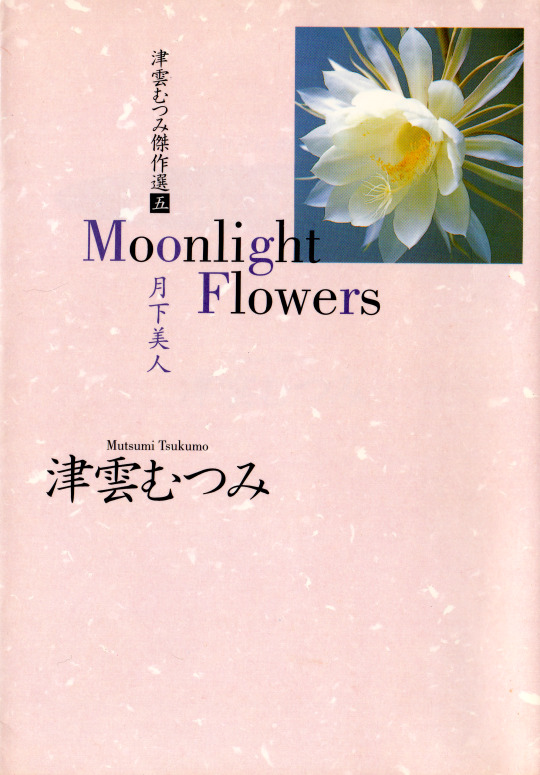
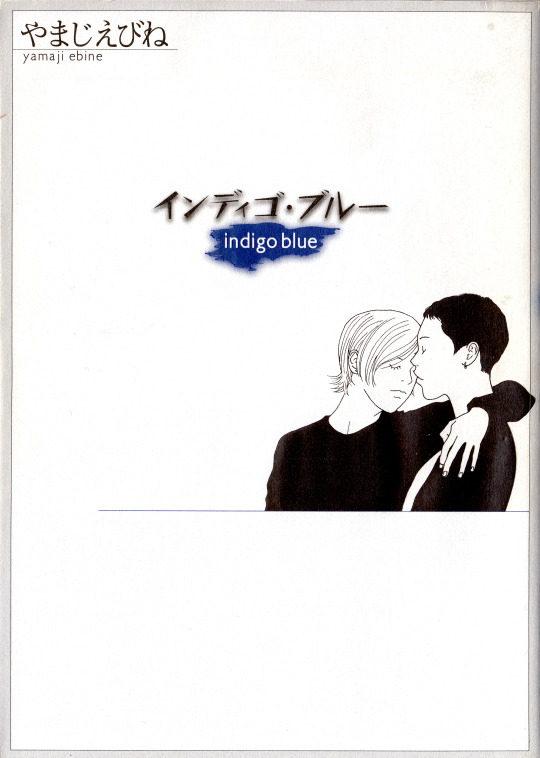

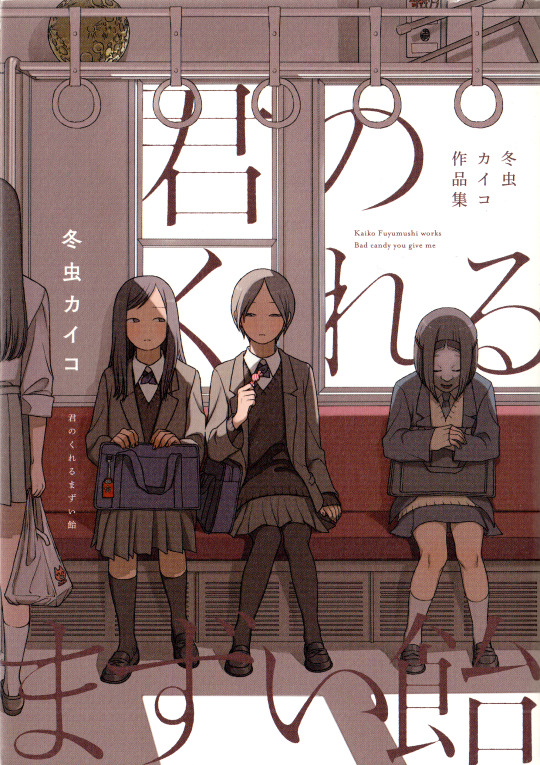
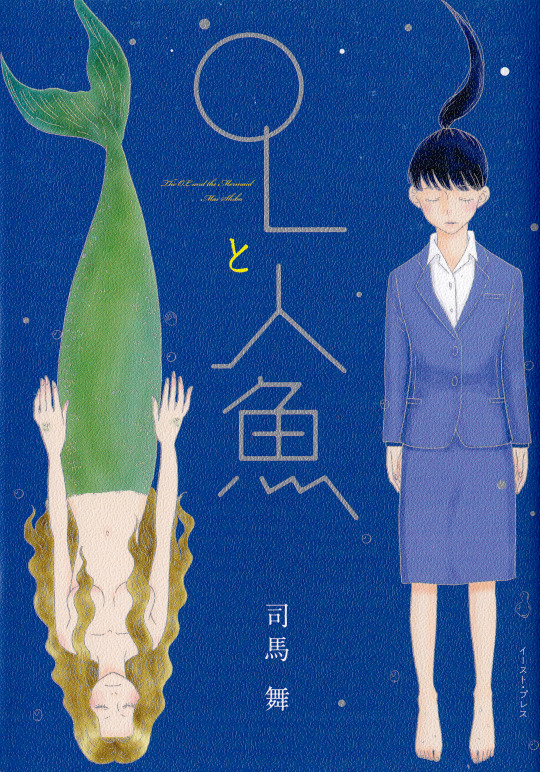

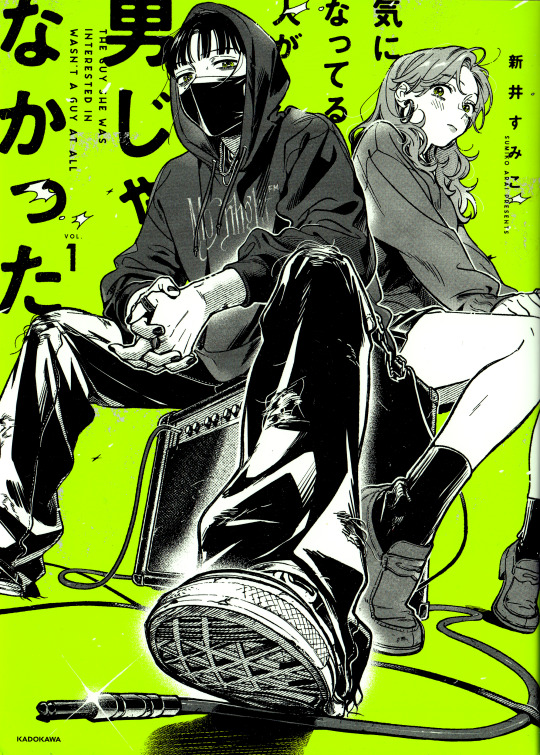
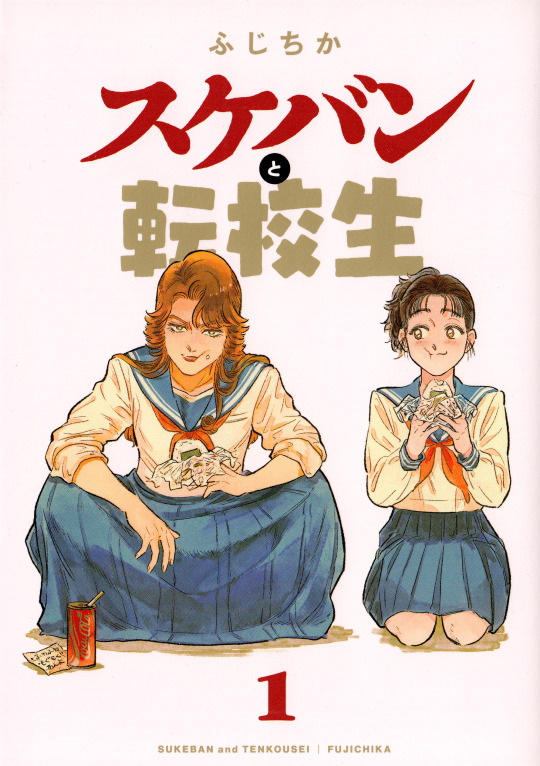
Recurring themes in 2023: my year of lesbian and yuriful manga
Doing this a little different when summarizing 2023. Since I stuck to my decision to not start buying any new licensed series and mainly did cultural catchup for both english and japanese manga I didn't really read enough hot new releases in 2023 for them to warrant a list of their own as they usually do. So to catch up on the months without a roundup as well as a year end summary I will do some themed lists!
The first came to easy since a noticeable trend was how much lesbian and yuri manga i made time for. For clarity I make a subjective distinction of lesbian and yuri works, just as some works I'm more inclined to describe as a Gay or LGBT story rather than a BL if it wasn't published in a BL imprint or invests time to do cultural or social commentary. Now to the list:
Among my favorite lesbian manga read in 2023 are: The Girl That Can't Get A Girlfriend by Mieri Hiranishi Moonlight Flowers by Mutsumi Tsukumo Indigo Blue by Ebine Yamaji Umibe no Kain by Minori Kimura
I won't reiterate too much as I already talked about it in a roundup but Hiranishi gave an extremely refreshing perspective on being a woman who loves masculine women, the dark story of her first heartbreak and the path forward. Love that Viz took the initiative to give her a graphic novel edition and promote her platform by licensing The Girl That Can't Get a Girlfriend. I've always found women's manga to be a not that secret treasure trove of lesbian stories yet I hadn't read the classic that is Moonlight Flowers... Just a truly suspenseful and romantic story of lesbian love as liberation and freedom that I can't recommend enough. Just with a clear warning of depictions of intimate partner violence that could be upsetting.
Yamaji has a well known track record of exploring lesbianism as well as bisexuality and I think Indigo Blue was extremely interesting in its explooration of the protagonist and her journey to figuring out what she wants as she's caught between two relationships. Another story of a woman's journey to confront who she is and what she wants: Umibe no Cain was a rather heartbreaking story of a young woman seeking refuge with a woman older than herself and as they start forming a frienfdship she begins to face the hurt and trauma she faced from her mother. But as the two women grow closer their relationship might take a turn that they can't come back from.
In the yuri-ish category: Kimi no Kureru Mazui Ame by Kaiko Fuyumushi OL to Ningyo by Mai Shiba
Won't reiterate too much of Kimi no Kureru Mazui Ame as I already talked about it in a roundup but love bite sized depictions of a miserable adolescence and toxic yuri but not quite. And if you found yourself taken by the more supernatural stories in this collection then may I recommend OL to Ningyo? Described by the author themselves as yuri-ish this collection depicts the bonds of human girls and their non-human counterparts. Humans, vampires, tengu, mermaid, and oni all face their own challenges and conflicts both romantic and otherwise.
In the Now That's What I Call Yuri category: Natsu to Lemon to Overlay by Ru & Miyako Miyahara Ki ni Natteru Hito ga Otoko Janakatta (The Guy She Was Interested in Wasn't a Guy At All) by Sumiko Arai Sukeban to Tenkousei by Fujichika
Natsu to Lemon to Overlay is the manga adaption of a yuri award winning novel novel that I picked kind of at random. An aspiring voice actress struggling to make any career moves are requested by a mysterious woman to read the obituary at her own funeral. What happens next will warm your heart. The Guy She Liked is one where I'm just going to assume most if not all of you are aware of so I'm just going to say that I like it and am looking forward to the next volume 👍 And last but not least: an adorable 80's throwback with some truly heartwarming moments and developments not to mention very funny: Sukeban to Tenkousei by Fujichika
189 notes
·
View notes
Text
When Is a Small Press a Good Fit?

When it comes to publishing, many writers will think about big publishers first. However, there are a lot of different publishing options out there to explore. NaNo participant and author, Clara Ward, talks about their experience publishing with a small press and gives you questions to consider while you think through your publishing options!
NaNoWriMo inspired me to write. Signing with a small press gave me the support I needed to publish a book I love.
I’d published books before—starting with NaNoWriMo sponsor deals in the early days of online publishing—but I never had the right skill set to promote those books. As a result, they never truly found their audience.
In November of 2020, I poured my heart into a genre-blurring near-future tale of sailing across the Pacific and building a neurodiverse, queer, and possibly magical chosen family. In 2021, I titled it Be the Sea and asked myself: What am I going to do with that?
1. Are you looking for fame or family?
Small presses are as varied as the people who form them. If you read widely, you may already have a treasured book on your shelf from your publisher-to-be. Try asking NaNoWriMo friends who share your interests if they’ve discovered any surprising or emerging sources for great reads. (At the very least, you may find books you’ll love in unexpected places!)
Admittedly, a small press doesn’t have a fortune to spend on paving your path to fame. But I have never felt as seen as when my soon-to-be publisher, E.D.E. Bell at Atthis Arts, wrote back, “I’m really in love with what you are doing and would like to talk about it.”
2. Do you have the bandwidth for working with others?
Even with the most supportive small press, you may have to push outside your comfort zone. I know authors who love the absolute control and freedom of self-publishing. For a time, I felt very comfortable just posting my NaNoWriMo fanfiction novels on Archive of Our Own. At most, I had one or two beta readers to offer feedback on those works. Whereas E.D.E. told me in one of our earliest conversations that in addition to our three rounds of editing we’d need “a good number of betas” to cover the range of topics we were working on together.
I was delighted! I knew what I’d written was ambitious, and I welcomed all the feedback I could get. But it turns out, each extra person in a process adds new challenges and delays. I had to stretch my empathy as well as my publishing timeline because, to quote E.D.E. again: “It’s a lot of emotion (as well as brain cycles) to go through...” Outside perspectives will only improve your writing if you are willing to work with them, to truly listen and learn.
3. Can you handle the two-way commitment?
No form of publishing is easy. The myth that authors write while others handle business and promotion is not true at the top, and certainly not with small presses. In my experience, working with Atthis Arts was like joining a team or chosen family. Beyond certain paid tasks, such as editing and sensitivity reading, I discovered a community of authors who freely offered coaching before my first public reading, social media boosting, tips for author webpages, and an extra pair of eyes on letters requesting bookshop readings or other events. While not all small presses work the same way, this supportive culture proved to be an excellent fit for me. Naturally, I wanted to give back whenever possible.
Small presses can only succeed with community. This month, as I promote the launch of Be the Sea at bookshops in Mountain View, Davis, and Sacramento, I will be introducing many Californians to my Michigan-based small publisher, Atthis Arts. When I stand up as a panelist at Norwescon in Washington state or at various science, library, or Pride events later in the year, I’ll be promoting more than Be the Sea by Clara Ward. I’ll give back by sharing my appreciation for small presses, the supportive and inclusive practices they can normalize, and the opportunities they open up for future writers and readers.

Clara Ward lives in Silicon Valley on the border between reality and speculative fiction. Their latest novel, Be the Sea, features a near-future ocean voyage, chosen family, and sea creature perspectives, while delving into our oceans, our selves, and how all futures intertwine. Their short fiction has appeared in Strange Horizons, Decoded Pride, Small Wonders, and as a postcard from Thinking Ink Press. When not using words to teach or tell stories, Clara uses wood, fiber, and glass to make practical or completely impractical objects. More of their words along with crafted creations can be found at: https://clarawardauthor.wordpress.com
Photo by Hümâ H. Yardım on Unsplash
188 notes
·
View notes
Note
oooh please tell us what writing rules are garbage I would love to hear more
it's not that they're garbage, which isn't what i said, just that they annoy me and even then what annoys me is not the "rules" themselves (because i do believe they can be useful depending on what you're writing) but when some of them are put out as the only way to write something as if storytelling is a one-size fits all approach, as if you can reduce the millenia-long history of literature into a fail-proof formula that will work for all writing across all cultures with no room for experimentation.
i think there are as many ways to tell a story as there are stories and how you tell something and the kind of language you use will vary depending on what language actually means to you as a writer. hemingway and faulkner both famously took digs at each other for their styles (even though i think there was a lot of admiration between them) but they are also two very different writers with two completely different approaches to language and how they use that language to say the things they want to say: neither is inherently better, or more right, than the other--their approaches were just right for them; if faulkner wanted to write using the "older, simpler, better" words hemingway loved, he would have. if james joyce wanted to depict dublin the way dickens depicted london, he would have done so. but they didn't.
someone once posted an excellent breakdown by jeff vandermeer of the different writing styles employed by different authors which i was silly enough not to save at the time, but in it he gives an overview of the structure of their sentences, and how complicated or "rich" the language is, without pitting one style against the other. and to be honest, i think writing advice that encourages you to examine and look at that relationship with language, and what it holds for you (and others) and why, is probably more helpful than blanket statements like "stay away from ambiguity" or "avoid long sentences" because neither of those actually mean anything--a sentence is a vessel but it's also a tool, like a hoghair brush or a palette knife; the value of its impact is not an essence that exists in and of itself, but entirely dependent on how you use it, otherwise all literature would just read the same way.
strict adherence to a particular form or structure within a language does not automatically make for better writing, especially not when so much literature actually consists of, and is built from, works and authors actively rebelling against those same traditional forms and structures (but which is also not to say that those forms and structures are inherently useless, either). you can say that long sentences "risk distraction" or are "ineffective" but then where does that leave someone like laszlo krasznahorkai, whose prose runs on like some kind of breathless, hypnotic incantantion for 20, 30 pages without a single full stop in sight? or a book like solar bones by mike mccormack which is made up of a single sentence going on for 200 pages? i'm not saying long sentences can't be boring or tedious, but in all honesty so can short sentences--so can any writing that follows the "rules" to the letter. if something is poorly written, the "rules" matter very little; if it's well written, they matter even less.
all that said, telling people to "avoid long sentences" is not inherently a bad thing because i think the core of it is wanting to ensure your writing remains clear, which is a fair point--but it's an issue, to me at least, when it turns into one of those dictums or pronouncements that actively narrows the potential range language can actually have. clarity is not always about length, or whether or not you cull all of your run-on lines--mihail sebastian drew a very nice distinction in one of his novels when he said "[is] there’s a single way of being clear? A notary can be clear, or a poet, but they don’t seem to me the same thing". a long sentence can be clear, but its clarity exists on different terms to a sentence that is five words long, because its relationship to its content is different. and at the end of the day, that relationship is really what it's about for me and it's distinct to each work and its author.
writers use the language and form they use that best allows them to say what they want to say. no one in their right mind is going to dismiss zadie smith for not writing like angela carter or angela carter for not writing like hemingway or hemingway for not writing like beckett or beckett for not writing like mallarmé. robert frost and sara teasdale were no more correct than the beatniks were. i love pared down, beautifully concise prose, but i also adore books that relish in language and all the various, multi-coloured layers of it, books that eschew (traditional) plot and books that question their own form and the reality of that form, and books that tell a story as straightforwardly as possible.
to be honest i think one of the most formative things i came across, years ago now, was this piece by gary provost, which really sums up the whole notion of "writing rules" for me:
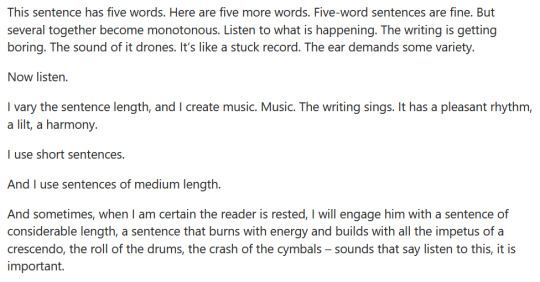
this is not about do's or dont's. it even breaks the first writing rule i learnt in school ("never begin a sentence with 'And'"). but what it does is center an intimate understanding of language, where it can go and how it can get there, and what you want that to do. that's where it's at for me!
602 notes
·
View notes
Text
There might be a cultural difference/translation shenanigans/general romance writing tropes that is the cause of this, but I think it's nifty that both Towa and Akira from their respective horny gay visual novels kind of read as acearo. Akira is a deadringer (sex doesn't exist to him to the point where he doesn't realize the "slaves" Arbitro breaks and peddles in his little tag shop are a sex thing, romance also does not exist to him), Towa is more debatable since he does get dicked down on the regular but it's clear from his internal monologue that it's nothing that really interests him beyond maybe cashing in some stimuli to make his turbo-depression let through at least 1 dopamine. Neither really express attraction, ever, even when they're like 3/4ths through any given route with a guy, sexual and romantic attraction from their end is just non-existent. It mainly culminates in "we're ride or die now. I guess I don't mind it if you tickle my prostate in passing." rather than "I love you and want to husband you" which is oddly perfect to my partly romance repulsed aro brain.
Towa especially is pretty detached to a degree that almost becomes comical. The closest he gets to being romantically invested I'd argue is with fucking Madrame. Because ofc that's how his brain would operate. Otherwise he's just like "yeah ig we can hang and do monogamy if ur gonna be this into me." and the narrative is so real for never making a problem out of it. Or maybe it does bring attention to it at the end of lawyer guy's route buuut Iiii haven't finished that yet ooooopppsss. In so much romance media, one party never dropping the "I love you" would be framed as a Problem milked for Angst which always makes me shrivel and die a bit, so it's soothing when these twinks are never vilified for being romantically unavailable on an emotional level.
Aoba meanwhile i dont think is ace i just think he's kind of a no-homo brained bimbo. Oh no Clear's dying wish is that i get bouncing on that dick, guess i have to!! Oh wow gee, Noiz feels nothing in the body? I'm bouta disprove that big time, get your peanits out brother and we will see about those nerve endings!! My dog is a man in my brain who wants to boink me? Well I'll be darned can't argue with that--
I think about nitro+chiral games too much
44 notes
·
View notes
Text
reading the bluelock light novels and theres so many fun lil character traits and info thrown in (probably not on the wiki bc the LNs dont have an official english release yet)
isagi was a crybaby and a scardy cat as a kid
he was also really senitive to sounds and they’d make him cry (he just like me fr)
isagi’s always had really great spacial awareness and vision, even as a toddler
nagi lived at student dorms at hakuho academy (which explains why his parents dont live w/ him)
he got into hakuho, an elite tokyo prep school, with only two weeks of studying
there were two different rumors abt nagi amongst his classmates, one saying if you talked to him you’d be cursed with bad luck and the other saying youd find happiness after talking to him, the curse rumor is more popular
(nagi my poor guy, his classmates think hes a weirdo just bc hes quiet an not interested in rich kid pissing contests)
he also has the nickname of ‘thousand year netaro’ bc he sleeps in class so much lmao
he doesnt study but still gets good grades, at least in social sciences
nagi helps his class win a volleyball tournament (that he was forced to participate in) despite knowing nothing abt the rules purely based off of his height, reflexes, trapping skills, and desire to finish the game quickly so he can go home lmao
bachira refers to his mother by her given name, yuu, which would typically be disrespectful af in japanese culture but in this context i think it just displays how close they are + the fact that bachira’s first/best friend is his mama :’)
he walked (dribbled), slept rough, and hitchhiked all the way to osaka from chiba prefecture for 5 days just to go see one of her art exhibitions too
he got a fortune from a shrine that literally read that he will meet his “ 運命の相手” - unmei no aite, literally ‘partner of fate’ or ‘fated partner’, bachisagi soulmate-isms r crazy
he won a 4 on 1 fight with a bunch of delinquents in osaka
rin liked ice cream but really he’d be happy with anything as long as sae bought it for him
the itoshi bros played for the kamakura united youth club, which won the U15 national league
they shared a bedroom growing up
rin gets bad grades in every subject other than english bc hes too busy thinking abt football, and hes only good at english bc he wants to go pro and play internationally
rin got into horror movies and games only after sae left for spain, he likes the thrill they give him, especially splatter films
he found a scene of someone getting chopped up w/ a chainsaw calming after he had a rough day,, damn okay rin in there anything u wanna talk abt edgelord?
“Perhaps because of this stress, he has recently been watching shark movies at night, where sharks attack humans. It’s refreshing to see a giant man-eating shark attack and munch on humans.” what a fuckin chuuni oml
sae got trending on japanese football twitter for scoring a hattrick for real madrid’s youth team
rin did the tongue-out-in-concentration/bloodlust thing pre-bluelock too apparantly
he didnt talk to sae whilst he was in spain bc he didnt want to bother him but he kept up news of him and thought abt him a lot
“He thought he would just shout out loud “I'm the best in Japan!” and hug him, but in reality, that didn't work out that way” <- rins first thought seeing sae after 4 years, excuse me whilst i sob
chigiri went to a ‘jitsugyo’ school, which is like a vocational tech or business school, it also has a foreign name (’lacosute’) so its probably a private school, maybe missionary?
chigiri likes cats awww, there was specially a stray black cat he’d talk to and buy karinto manju for
his ACL is attached to his knee in an odd which which is why he can run so fast
chigiri stopped cutting his hair after he quit going to his school’s football club once he finished rehab for his knee
reo got baya to hire him a whole team of ppl including a coach, nutritionist, nurse, etc once he decided on football, fuckin rich ppl i swear
all the adults who worked w/ reo sing his praises but also said how cheeky he was lmaooo
reo was learning english, spanish, and german in preperation for going pro
he also got a specially made football training VR facility made for him this boy i swear
reo bribed the hakuho football club w/ fancy meat and the opportunity to meet idols to get them to put more effort in
immediately upon meeting nagi reo notices his height and how ‘cool’ and ‘intense’ his trapping is like okay fruit
#bluelock#bluelock light novels#isagi yoichi#nagi seishiro#bachira meguru#itoshi rin#chigiri hyouma#mikage reo#og post //
704 notes
·
View notes
Note
Hey there I’m getting confused so I just thought I’d ask. You post a lot about NIF, various items with the word Kingdom, and now AA. The thing is a lot of the names seem to be the same and the faces(?)
Are these shows/stories related, if so how, and is there a watch order you’d recommend?? Thanks :)
Oh hello there I'M GLAD YOU ASKED

So.
The Three Kingdoms era was a period of Chinese history that spanned from about the end of the Han dynasty in 189AD to the the year 280AD (at which point China was finally re-unified). It was always a very popular era for the country, which gave rise to a lot of popular heroes. The first well-known person to make a full narrative out of the events was a fellow called Luo Guanzhong, who wrote a ~800k word novel called The Romance of the Three Kingdoms in the 14th century, a highly romanticised (lol) version of events which brutalises some historical figures (r.i.p Zhou Yu) and glorfies others (incl. one of China's greatest blorbos, Zhuge Liang).
Here he is, in various forms:
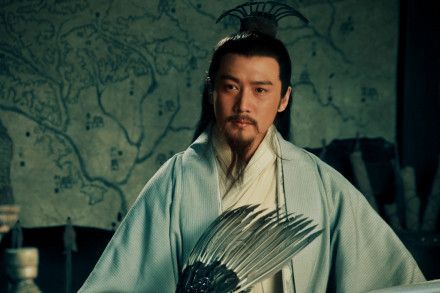
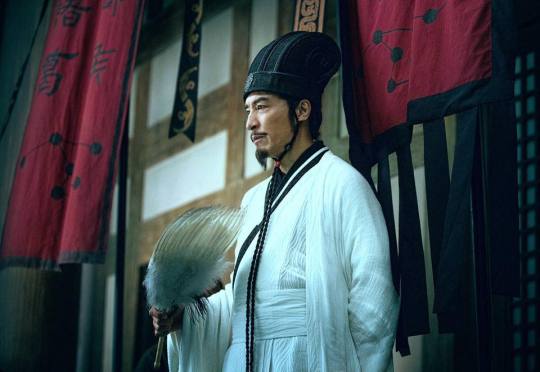
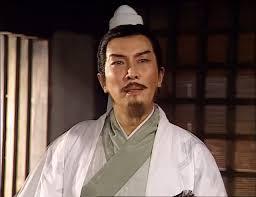
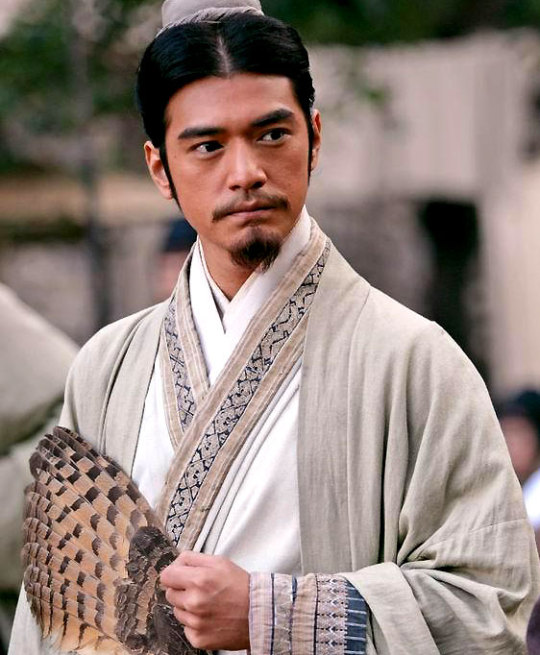
So I started by reading the book, mostly because it's one of the Four Great Classic Chinese Novels, and I wanted to learn a bit more about actual Chinese history and culture instead of just watching endless fantasy.
And then after the book, I discovered that there are unsurprisingly a LOT of adaptations of it! Some are more faithful to the novel, others more faithful to history, and some are just... *War flashbacks from the few episodes I watched of The Three Kingdoms RPG*
As far as I am aware, the two main adaptations that attempted to serialise the whole goddamn story rather than just some parts of it, are the 1994 TV adaptation, and the 2010 remake. I decided to watch the 2010 first because I liked the look of it (and I also found a nice HD download of, with good subtitles).
The Advisors Alliance is kinda like the "bad guy POV" adaptation which focuses solely on the story of Sima Yi, who shows up towards the middle of ROT3K and (SPOILER) basically wins in the end. He's not actually a bad guy, but he's often portrayed as the antagonist because he was on the opposite side to history's greatest blorbo, Zhuge Liang.
It can get a bit confusing because this fellow, Yu Hewei, seems to REALLY LIKE the three kingdoms era because he has so far starred in no less than FOUR different adaptions as various characters. But he decided to really confuse everyone by being Zhuge Liang's beloved liege lord Liu Bei in the 2010 adaptation, as well as Liu Bei's primary sworn enemy Cao Cao in the Advisors Alliance (2017). So yeah, we all like to laugh about that.
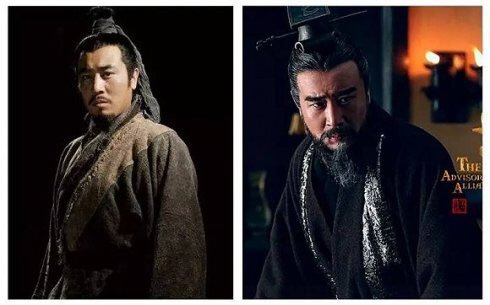
Yu Hewei every time he sees someone is making a new ROT3K adaptation:

As for Nirvana in Fire, that's pure fiction and functionally unrelated to The Romance of the Three Kingdoms (though perhaps the author took some inspiration, who knows?) But the main female lead is played by the same woman in both AA and NIF, the delightful Liu Tao:
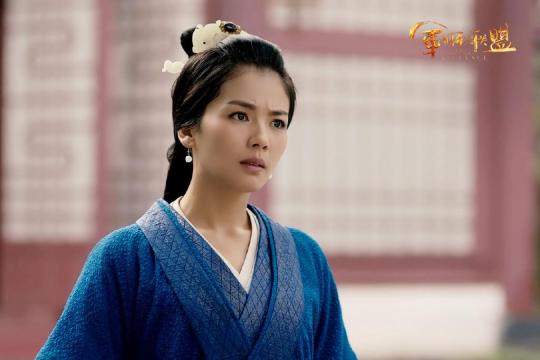
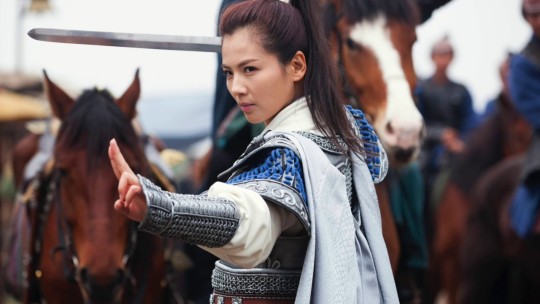
And both shows also share another cast member, Wang Jinsong, who plays "disillusioned old friend of the king/emperor who now wants a divorce".
As for which you want to watch first? Well I guess that's up to you. Nirvana in Fire is a GREAT piece of fiction and is certainly more popular fandom-wise. If you're interested in digging your teeth into some messy, bloody political history full of homoerotic yearning, watch The Three Kingdoms. And AA is kind of like, a cross between the two!
P.S Red Cliff (2008) is another good fun adaptation that focuses on just a small part of the three kingdoms story, and has what I think is personally the best (or at least, fairest and kindest) of all the Zhou Yu portrayals.
29 notes
·
View notes
Text
Something I like about epic the musical is that it Gives it's changes to the original text an actual Purpose
( The first couple paragraphs are basically a rant regarding retellings. If you only want to hear about epic Skip to paragraph 4)
1. I am a bit annoyed by the lack of. Understanding as to why RETELLINGS aren't the most historicaly accurate things in the world. Sorry to break this to you, but that's both just how they work and I would guess how they reach success. Ancient Greece is a much different culture than our own, And most of us would be terrified to actually live back then. When you are Trying to create content That is based on ancient Greece And you want it to be successful/ At least reach a wide, and notably, MODERN audience. You're likely going to have to take some creative liberty And change a few things. Don't get me wrong, YOU DO NOT HAVE TO LIKE RETELLINGS KNOWING THAT FACT ( Me personally, I'm not the biggest fan of Miller's novels Even though I do like epic) BUT IT IS SOMETHING TO BE AWARE OF. And because of that I don't think I would ever expect a retelling to be perfectly accurate And I don't. I had interest in mythology LONG before epic the musical But I didn't actually read the Odyssey until getting into epic. I did not expect it To be just like the musical, I knew Odysseus was going to be much more of an asshole, along with other characters. The odyssey and epic are different pieces of media to me And I am not less of a mythology nerd for liking epic ( Though I will admit that sometimes I take tiny little fun facts of mythology And like to think of them in the context of epic, but that's just for fun.)
2. The Only time being a fan of retellings is wrong as if you genuinely believe they are perfectly accurate And refuse to listen to anything else ( Which has definitely happened, And mythology nerds have the right to be annoyed at that)
3. Some people only like to consume real mythology media, Others like both real mythology and retellings, Others only like to engage with retellings (I would hope they have the self-awareness to know It's not real mythology, From what I've seen some do and some don't, Unfortunately)
4. Ok. now on to what the title of this long ass rant says
I like that epic the musical Retells the story, Not only to both cater to modern audience But Also with its OWN purpose of man versus monster.
Obviously, this is not the point of the original text. Mythos Odysseus does not give a single fuck About the stuff that epic odysseus does. I don't know why the creator Decided to rewrite it this way, (If he's ever said why let me know) But I would assume he wanted to make something about the oddessy And this was simply a very creative way to Translate that for modern audience.
I like this because, yes, holy damn. It does have changes from the original text. But it's not JUST changing it. It's changing it with a purpose
It feels reminiscent of some kind of Dramatic play. the way that epic characterizes.
Polites' kind nature is Representative of the Concept of being merciful Represented in his lines such as " This life is amazing when you greet it with open arms" /"There is so much guilt inside your heart, So why not replace it?"
While in contrast you have eurylochus with more ruthlessness and cautious nature, this is Found in some of his lines such as "You rely on wit, and people die on it" /"we don't know what's ahead" / "I say we strike first. We don't have time to waste so lets raid the place-" /"Let's just cut our losses, You and I and let's run"
And then you have Odysseus, the man/monster. The first act of this Musical is his internal struggle With what He should be On that scale. And the other characters Represent this struggle in the song monster
" Is the cyclops struck with gilt when he kills, is he up in the middle of the night? Or does he end my men to avenge his friend and then Sleep knowing he has done him right?
When the witch turns men to pigs to protect her nymphs, is she going insane? Or did she learn to be colder when she got older and now she saves them the pain?
When a God comes down and makes a Fleet drown Is he scared that he's doing something wrong? Or does he keep us in check So we must respect him and now no one dares to piss him off"
He then Applies this to himself
" Does a soldier use a wooden horse to kill sleeping trojans cause he is vile? Or does he throw away his remorse and save more lives with guile?"
And this marks his turning point of deciding that Ruthlessness It's ultimately worth it if it means Getting home, as aeolus says "The end Always justifies the means"
It's in my opinion, a very creative way to go about retelling a myth. Is it accurate? Absolutely not. For example, circe (From what we know) is not protecting When she turns men into pigs, For all we know, she could just do it because Shits and giggles.
Her character and most others in epic is changed from the original. But it's not ONLY changing for the sake of apeling to the modern Western audience and being successful like Many other retellings. It is also and mainly changing for the sake of influencing the plot that Jorge Rivera herrans crafted For the sake of Retelling epic. It is creative and I enjoy it despite knowing it's not accurate.
#epic the musical#odysseus#the oddyssey#tagamemnon#the iliad#greek mythology#again you do not need to like epic the musical or any other retellings#you are allowed to only like greek mythology itself#as a history enjoyer i understand the frustration and think its COMPLETELY valid to be annoyed when someone uwu's a figure#hell i would be annoyed if someone did that to the EPIC THE MUSICAL version of odysseus#he's still an asshole he's still a killer and a liar in epic just a lot more guilty about it then he would be in the oddessy#if all retelling fans had self awareness that its just a retelling and didn't “soft boi” either myth or retelling#i think we'd all be much happier
102 notes
·
View notes
Text
2024 Book Review #38 – Play It As It Lays by Joan Didion
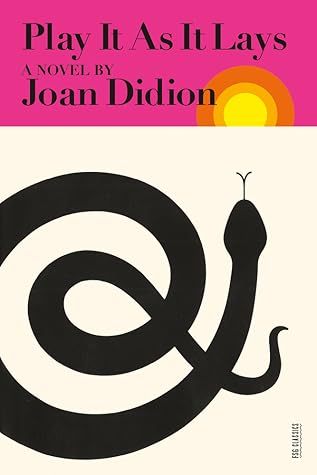
Didion is one of those canonical authors I always feel like I should already have read at some point (isn’t that what high school English class was supposed to be for). Of course this was a very vague feeling, and not attached to a single scrap of actual information about her and her work beyond the general time period and cultural milieu – so I grabbed this from the library and started it entirely blind (partially my own fault for skipping the introduction by a different and much worse author tbf). Fascinating book, artistically successful and emotionally affective, but not one I’m able to say I really found enjoyable, or even necessarily beautiful (it’s no Giovanni’s Room, to compare another bit of canonical latter-20th century high literature).
The book follows Maria Wyeth, an (increasingly former) actress in 1960s Hollywood, through her slow decline from up and coming starlet and wife of a prestigious young director to an enforced retirement as an isolated upscale sanitarium/hospital resort. Which is hardly a spoiler – the book starts at the end and jumps through the timeline freely, and in any case the whole thing feels telegraphed to the point of inevitability. Maria’s life in LA is contrasted with how she grew up in a tiny desert town in Nevada, so small it at some point stopped existing, and in the process more or less gives you the narrative of her life.
Which is as close to a plot as the book has, really. Maria and her internal monologue are the near-sole focus, and her view of the outside world and what’s happening around her basically always says more about her than the world. Watching Maria’s life falls apart really is watching a car crash in slow motion – you’re never really surprised at any point, but the shearing metal and flesh are hard to look away from.
The book’s very much capital-l Literature, here meaning that the style and prose is at least half the reason to read the book. The story’s told through short vignettes (I’m not sure a singe chapter was more than ten pages, whereas the vast majority were two or three) and the deliberate, generous use of white space, both figurative and literal. Maria is pretty relentless in her self-deception and lack of self-awareness, and in any case is quiet elusive and vague with descriptions of people and events – reading between the lines is quite necessary. This overall really does work for me - the imagery is vivid and memorable, and Maria’s head is a compelling and believable place to be.
It’s also just intolerable. I have no particular issue with deeply unsympathetic, tragically unselfaware, or wince-inducingly self-destructive characters, but Maria sure is all three of those to a degree I rarely see. More than that, she is just profoundly passive. It is, for me at least, far easier to be invested in operatic delusion and hubris leading to ruination than a just resolutely thoughtless and pettily cruel person letting her life rot around her. Which is a failure of literary empathy on my part, probably, but did make this a somewhat frustrating book to read. You’re left want to scream at Maria to just do something (anything!) that she isn’t led to by people around her like an ornery goat to water.
This is probably exacerbated by the supporting cast. Who are all very much portrayed as hopeless, clueless gamblers and unprincipled, hypocritical Hollywood decadents,, absolutely – but despite that, keep trying to reach out and offer her lifelines or support. Which is mostly surprising because she might literally not say a single kind word to another human being in the entire book, is relentlessly caustic in her internal monologue, and sure isn’t doing favours or advancing the career of anybody. The real tension of the book ends up not being whether or not she’ll destroy her life and more how long before everyone around her just lets her.
It’s a blisteringly cynical novel overall, really – both in its portrayal of individual characters and of society as a whole. I joked while reading it that it felt like American Psycho without a Patrick Bateman, and while that’s a bit too far – everyone’s still very recognizably human, most of whom do care about at least a few things besides status symbols and dick measuring contests – but the portrayals of Hollywood and Wall Street certainly feel like they rhyme.
Though the implicit politics of that cynicism do feel do feel very different here. Very possibly because the back cover called it something like ‘a blistering satire of the excesses of the ‘60s’ (paraphrasing from memory), but the book definitely ended up feeling very (socially) conservative, full of worries about broken families and marriages of convenience and just generally decadence. The whole plot where Maria gets a motel-room abortion to deal with the consequences of her affair which almost kills her, sends her spiralling into months of total, life-ruining depression, and destroys her relationship with both her husband and her paramour feels like something you’d only see coming out today in explicit pro-life propaganda, for example; certainly it’s a trope I’ve seen complained about more than (until now) I’ve ever actually seen done. The fact that Maria’s foremost redeeming feature is always her love for and desire to be with her (disabled and permanently hospitalized for vague reasons), and that the climax of the book is a suicide directly caused by infidelity, also. None of which should exactly be surprising, really – a book almost as old as my parents has dated opinions on social issues! - but for some reason I always expect canonical authors to have been free-wheeling libertines and bohemians.
Speaking of being written nearly sixty years ago – the time capsule quality of this book is positively fascinating. Which I say whenever I read something from before the millennium, but still – the ‘60s are still so profoundly mythologized I do love the chance to see anything written about them at the time, if only for ‘the past as a foreign country’ tourism reasons. The Hollywood of exploration, drug abuse, meaningless sex, vicious gossip and every combination of the above feels like it could almost be written about today, right up until the point where an easy divorce means finding an amenable judge and finding a witness to corroborate the husband’s admission of wanton emotional abuse (which becomes a stark reminder of how horrifying even a historical five minutes ago was when you consider what happens if you can’t meet any of those conditions). The illegal abortions, the utterly casual homophobia, the auteur theory being a hot new thing, the cult of the open road. It all adds up to an interesting effect.
Speaking of the cult of the open road – Maria’s only real sense of peace, happiness and self-control in the entire book is when she’s spending all day cruising the highway at dangerous speeds just for the sake of it, without itinerary or destination. No real coherent point to make, just that there’s something truly and incredibly American about that? The descriptions of the Nevada desert and highways, too.
But yeah, an expertly written novel that’s positively lovely in places (the opening monologue is near-sublime, for example), but not one that really awed or oved me the way some other literature has.
32 notes
·
View notes
Note
not to b sappy on main but i really just wanted to wholeheartedly thank you for this. i read whatever i could get my hands on when i was younger, because i hadn’t really figured out my reading taste yet, just that i liked reading. and even after i realised i was queer, at first i didn’t really start seeking out books with queer characters in them. i guess i felt like i was an abnormality — something i know that a lot of us feel, particularly if we grow up in a place where there isn’t anyone who is like us. but i’ve been trying to seek out more queer media and history this year, if only because i finally managed to internally embrace my queerness for the first time, and so for the first time, i wanted to know more about our history and our culture and i wanted to be someone who could see myself in queer characters. and your blog has just really really helped with that. at first, i was reading any queer books i could find, which was… nice, but i eventually got tired of books that weren’t from genres i enjoyed, or books where the entire cast was white (nothing’s wrong with being any race obviously, i’m just not white and so their experiences weren’t what i wanted to read, since i was reading to try and comfort and see myself — or close to myself, anyway), or books that just weren’t my thing. hence, this blog. i’m now reading queer novels, comics, essay collections etc all the time, and often the characters are the same kind of queerness as me, or from my country, or follow the same religion i do. and i can’t tell you how much that’s meant to me. i honestly feel like a different person — a lot happier, a lot more settled, a lot more of nodding my head to others’ experiences and crying because i no longer feel like i’m the only person who’s desi, african, queer etc (being at the intersection of a lot of different marginalised groups is… interesting, at least in my case it just meant i had less people from which to relate to and never really felt accepted anywhere as i was too different for each ‘group’…. something which reading all of these books has helped combat). so, yeah. i’m planning to write my own stories about queer people and characters now, and looking into archives that my country has for us. for the first time in a long time, i feel genuinely optimistic and excited about my future as a queer person, because it just… it just feels so much more like a community to me now, reconciling my childhood love of reading and all of my experiences and ethnicity and religion with my queerness. and i have you to thank for making that happen for me and i know, in some capacity, for a lot of others. just… this is super long and rambly, but i just kind of wanted to convey how much this has (and does) mean/t to me and how grateful i am. thank you for uplifting our voices — i never knew how much i needed to hear them, and how healed i would feel because of that.
This is the absolute most perfect kind of “long and rambly” and I’m not saying I’m crying but I’m not saying I’m not. Thank you so much for sharing this with me, and I’m so, so happy you’ve found books you love and that inspire you and that help encourage you to share your own voice with readers and the world.
I’ll be honest, it’s been a tough year and I have thought more than once about shutting down this blog because it does take a lot of time I don’t really have. But I think about a post that was sent to me a few years ago, and that always helps keep me going, and I know without a doubt this note will help inspire me when I need it too <3
28 notes
·
View notes
Text

So I never replied to your question, @strangeunknownarbiter, but then I started writing a reply and it became too long, so here it is in post form! So, I absolutely love Jane Seymour’s portrayal for her vivaciousness and wit, and she’s got great chemistry with Anthony Andrews…but the script sure doesn’t do Marguerite justice. Aside from my annoyance with love triangle nonsense (with Chauvelin?? I mean, come on), the story doesn’t focus on Marguerite enough, and we don’t get to see her intelligence and courage as much as they deserve. ALSO, I think it’s kinda crucial to the story to not be showing the audience the Pimpernel’s identity from the get go? It’s part of the same deal with losing Marguerite as the protagonist. It does the story and characters disservice by its comedic shots of Percy running around behind her back while they’re courting.
Let the audience have the opportunity to put themselves in Marguerite’s shoes as to her frustration with her dumb husband and investigation of the mystery!! It’s such a female story in many ways, even playing with the Bluebeard trope, and the adaptions are (like Orczy) in love with Percy Blakeney. I truly think Marguerite’s character and story are the realest thing in an admittedly romantic wish-fulfillment tale (Percy as the Ideal Man, rescuing folks from the guillotine, and glorifying Britain).
I don’t deny the awesomeness of the hero-with-a-secret-identity genre that Orczy started, it is deservedly iconic and has truly captured our imagination since in superheroes and other formats (like Zorro). But Percy is largely just that—superhuman! The problem is not so much that he’s unrelatable as that he’s unbelievable, and Orczy’s obvious infatuation with him is a little cringy to say the least. The realest thing, the most sympathetic quality Percy brings to the story is his love for Marguerite AND his foolish pride which keeps him from her! Alongside the compelling but larger than life story of a fantastic hero, Orczy tells the story of a husband and wife who allow pride and mistrust and hurt feelings to nearly destroy their relationship—and that’s more truly interesting to me than the story’s humorous and fantastical adventures (although I do genuinely enjoy those and think they’re awesome). I think this part of the story elevates Orczy’s first novel far above the rest of the series (admittedly I’ve only read 4 or 5 of the others) and far above the 1982 adaptation and the musical as well, as much as I enjoy both! I’d love to see another adaption/reboot of The Scarlet Pimpernel that follows the novel’s structure and framing more closely AND puts Marguerite back in her rightful place as a true protagonist (the adaptions do keep her as a protagonist….but like, in a romance novel, cheapened way? Idk, I don’t mean to be hypercritical but I feel like Marguerite’s arc/character get majorly simplified and her humanity is lost, but that’s another post). The fact that the audience knows the Pimpernel’s identity from cultural awareness could actually be a source of tension and drama rather than the opposite?! I’m not denying the story’s humor and irony, but I think you ah r to balance those with the dead serious agony Marguerite (and Percy) go though.
Honestly though, all that being said, the 1982 adaption is shockingly good for what it is, and my main complaint with both it and the musical is really just adding a love triangle between Percy, Marguerite, and Chauvelin. It’s obnoxious enough in the movie, but it’s lowkey character assassination in the musical. I watch the 1982 adaption with great enjoyment, but I think the things I pointed out above are the key differences between “good enough” and “great.”
Thanks for giving me the opportunity to articulate these things, @strangeunknownarbiter! I’d love to hear your thoughts on the portrayal of Marguerite as well, if you want to share!
#The scarlet pimpernel#marguerite blakeney#marguerite st just#The Scarlet pimpernel 1982#Ranting and raving
10 notes
·
View notes